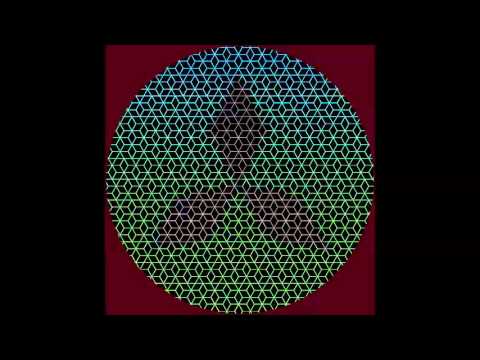Marshaling a refreshingly global musical attitude alongside seriously weighty production chops, Jack Adams, aka Mumdance, has had quite the run this year. The pared-down kinetic energy of the Take Time EP for Rinse combined warped eski rhythms and a skewed percussive palette to create some of the most electrifying grime around, alongside a brilliantly on-point vocal turn from Novelist. Adams’ brute technological bangers made in collaboration with Logos and Pinch, meanwhile, have solidified a clammy darkside aesthetic that evokes nightmares in the furthest corners of Bagley’s, Stratford Rex or Milton Keynes Sanctuary.
Something of the journeyman, in the last few years Adams has also traveled to Cairo to work via an interpreter with a host of mahraganat (electro chaabi) producers, learnt about tecno brega and Baille funk from the streets up in Sao Paulo, and produced collaborative music in Mexico – all projects displaying both vibrant eclecticism and inclusive spirit. However, while the music he has produced while traveling has often been imbued with technicolor verve, his latest project collates some of the coldest electronic music this side of No U Turn.
This week Adams and Rob Ellis, aka Bristol scene lynchpin Pinch, released the masterful Pinch B2B Mumdance mix CD. Displaying sharp focus and traversing greyscale waters that connect the audible influence of mid 90s Metalheadz – foreboding, soulful, downright brutal – with the rolling and open-ended spirit of the darker edges of the current bass spectrum, the mix is a clear statement of intent. Featuring exclusive tracks from both producers working together and solo, alongside a cast of like-minded music makers including Logos, Alex Coulton and Asusu, the mix plants the flag for another step in a darker UK lineage. No nostalgia trip, it’s a mix that takes the pioneering spirit of sub-laden future music, whether jungle, grime or weird techno, and flips the script with aplomb. The Quietus caught up with Adams to talk Bluetooth mahraganat transmissions, hardcore timbre and the importance of immersion.
You had a break from production recently, and have come back with some killer music – the Take Time EP on Rinse, various tunes with Logos and the new project with Pinch. I understand you’ve changed your set up, what was the reason for this?
Jack Adams: I moved to a hardware set up because I was finding it really hard to get the sound that I wanted, the sound that was in my head. I grew up on jungle and there is a certain timbre, you know? It’s a texture of sound that I love and it’s pretty much impossible to get via software – it wasn’t a programming thing or anything like that, it was just about the timbre. Things were also changing a lot in electronic music, and I wanted to take a little time to consider where I wanted to go and what I wanted to do. Things are very free and open at the moment, which is great. It reminds me a little of the 93/94 era of hardcore and jungle when people were just doing crazy shit without any rules at all.
I’ve been listening to the music you’ve made recently in Egypt and want to talk about that later. I’m less familiar with your travels in Brazil and Mexico, however – what did you get up to over there?
JA: I went to Mexico in 2011 to work with Toy Selectah in a collaborative project that he’d organised, which included loads of Mexican musicians and producers. I was working with a load of musicians on tracks that pulled together influences from a whole range of traditional Mexican sounds – cumbia, canto cardenche, nortena. We remixed it and created a kind of hybrid street music, a bit like UK funky. We spent a few days in the studio and one of the tracks came out on Mad Decent – that was the cumbia track. The other one came out on my mixtape Different Circles which was like a mixture of UK funky and cumbia.
When I went over to Brazil I was working with this band, Banda Uo Cavelo Do Fogo. They make a type of music called tecno brega, are you familiar with it?
Pumping, high tempo?
JA: [laughs] Yeah, exactly. The song that I made with them was like, cheesy techno. [laughs] They took me to this tropical island and we sat by the pool making this Brazilian style of music, it was amazing. And they really took me out, taught me all about the scene, they took me out to the record shops in Sao Paulo.
How big is the music over there?
JA: It’s coming out of mobile phones, transferred via SMS, YouTube rips, you’ll hear people playing it on their phones, everywhere – it’s a very mainstream culture. Tecno brega is essentially a young street music, bigger in Sao Paulo, although that may just have been the circle I was moving in. What we call baile funk, funk carioca – that stuff is much bigger in Rio.
I’ve always enjoyed global music though, that was just a part of the music I was drawn towards. I guess the first person to shine a light on me was Diplo, he opened a lot of doors for me. I got quite a lot of attention in quite a short period of time, and that was how I got involved with Toy Selectah, he came round to my house and then we ended up going out to Mexico a couple of times.
While you’ve been involved in a really wide range of music, the feeling I get from the new mix with Pinch reminds me very much of an old Metalheadz Platinum Breakz compilation – one vibe, and going as far as you possibly can down the road.
JA: I know exactly what you mean. A lot of people are making ‘jungle sounding’ records at the moment by rehashing old breaks and what have you. But I feel like a lot of this music is just missing the point entirely, kind of ends up sounding like nu-skool breaks or something. [laughs]
Nostalgia trip, yeah, there’s a lot of that at the moment. But jungle and drum & bass was always militant about the future. The mix has a very cold vibe…
JA: It’s cultural referencing. You need to remember where you come from to move forward to new and innovative things. That is the core of what I’m about.
How did you and Pinch come to work together?
JA: We met up at the Warehouse Project in Manchester. I’d got in touch with him initially, sending him a couple of tracks – ‘Legion’ and ‘Drumboss’ – which he was into, but I hadn’t heard back from him about. Collaboration should happen organically. When something is forced and it doesn’t feel right, that will be reflected in the music, so whenever I do a collab, I like it to happen organically. With Pinch we got on straight away. It was the same with Logos, we approach music in different ways and we complement each other in ideas and skill sets, and likewise with Pinch. There are some things we do which are vastly different, but we do tend to meet in the middle really well.
Something I find interesting about Pinch is that his music has always been so deeply connected to the soundsystem culture – it is very evocative of a distinct place and time.
JA: I think it’s important to see the context of music. That’s why I went to Brazil and Mexico and Egypt, to try to understand the music in the context of the place. Because I don’t think that you can truly understand something if you have not experienced it where it comes from.
That is why, this time around with my production, I wanted to make sure that I was coming at things from a different angle, referencing childhood influences which were essentially jungle, hardcore and shoegaze. I was also into punk and hardcore because I used to skate, so a lot of the music that I have been influenced by is tied to skating in some capacity.
But place is hugely important. For example, I’ve never really been into hip hop – I mean, I used to listen to Snoop Doggy Dogg and Wu Tang when I was younger, but it was never really a music that I could identify with. But now, being in Chicago recently, hanging out with a lot of the guys there, I just understood it a lot closer, you know? Right now, I’m doing this interview from Cashmere Cat’s place in New York, and he’s just been showing me a Kanye West album – I’ve never played a Kanye West album in my entire life, you know? [laughs] But now hip hop has kind of grabbed me. I just feel it’s important to immerse yourself in something. I can’t believe that I hadn’t been paying attention to all this drill stuff that’s happening in Chicago – Chief Keef and Sicko Mobb – but now I really enjoy it, through experiencing it in the flesh. Now I have this whole world of music opened up.
This brings us to Egypt, the ‘Cairo Calling’ project run by the British Council and Rinse FM. The musical parallels between electro chaabi/mahraganat and grime references are really interesting – how would you describe the music you made out there?
JA: Again, it’s just street music basically, its what the kids are listening to. I mean some of the stuff, the electro chaabi stuff, samples a lot of traditional music, but the guys that I was working with call it mahraganat – ‘festival’. They like to differentiate themselves from the original chaabi guys, who they feel are doing something a bit more traditional.
The Quietus editor John Doran did a whole series of dispatches from Egypt last year reporting on electro chaabi, which was the first time I’d ever heard of the music.
JA: It’s slightly tougher, mahraganat. It’s a party vibe. I think ‘festival’ is the perfect name for it because that is exactly what it is, a festival. They do sometimes sample traditional instruments, you may have noticed that [makes fast tapping noise with fingers] finger drumming noise, they use that a lot and it creates almost an open hi-hat 909 kind of sound. There are a lot of similarities you can draw between grime and mahraganat; they built it from the ground up. There are a lot of similarities between that and punk also, a lot of the kids making it come from pretty rough areas of Cairo and we hung out with them all.
But the thing is, they are like heroes in Cairo. They get mobbed – literally mobbed – when they walk down the street. It took about half an hour to do a ten- minute walk down the street from the hotel just because of the people.
So what is the infrastructure like for the music?
JA: YouTube and Bluetooth – that’s it, really. Because they don’t have decent internet connections. It’s awful. I was speaking to journalists and they were saying that if they had to do video content they have to leave computers on for like three days to get a story across. So the way people get music out there is via YouTube rips that are then sent on via Bluetooth. And that’s it. It’s crazy because people were playing me music and I didn’t have a grasp of it, and they’d play me brand new stuff in the studio and then we’d go out onto the street and the same tune would be blasting from everywhere, little shops, taxis, everywhere. I’d be like, ‘I swear I recognize that one’ [laughs] They have the streets on lock – they’re superstars. But they are all fiercely talented musicians as well. Like with Sadat, I can’t understand what he’s saying but the tone of his voice, his flow – absolutely incredible.
What is the workflow like with those guys?
JA: They use this old programme called Acid, mostly, sometimes Fruity Loops. But vocally they don’t have the same concept of structure at all – like I was trying to explain to them about the sixteen-bar grime thing. In grime or hip hop an MC will rap over sixteen bars, then stop. But they didn’t really get that, they just write what feels good for them – there are absolutely no rules. We were working with a translator who wasn’t musically trained. I was trying to explain, but they didn’t understand, so I ended up putting claps at the end of every sixteen bars and I was saying ‘when it claps – clapclapclap! – start… and when it claps, you finish’ [laughs]. They just do what sounds good to them and the freedom that affords is brilliant.
How did you find working through the translator? It must have been odd trying to communicate complex ideas.
JA: It was a very surreal experience, at times. A lot of stuff got lost in translation. We came up with some things that might not have happened otherwise though, which added another element to the music. It was almost like John Cage, adding a random Cageian element – it added some excitement.
And how about bringing the music over here? The recent mix you did for Dummy got a very positive response – do you ever play it in a club context over here?
JA: The thing is, they don’t have a soundsystem culture over in Egypt at all. Here, we’re very spoilt and have a lot of sub bass and low end in our music, but if you listen to their mixes it’s very busy in the high end. But it’s a completely different culture, a lot of the time it will be at weddings and stuff like that, portable soundsystems, so the music is designed to be carried in the high end. So it’s almost impossible to match up what I normally play – which is totally led by the low end – and this stuff, which is based around the high end. In the maharganat music, that is the way they like it. I mean, you can make it sit alongside the UK music, and I have been playing a lot of the versions that I made with them. But I think there is definitely a market for them to tour over here. Omar Souleyman tours over here and it goes down brilliantly.
Indeed. In electronic music generally, things are so much more open now, people so much more accepting in a way that they simply weren’t a decade ago. When I was growing up, if a jungle DJ played a record from a different genre at a big rave they would have been booed off; ditto certain techno nights. It was one style, all night. What are your feelings on the current, more open, climate?
JA: Well, not wanting to sound big-headed, but I think that the wave of DJs coming through in 2007/2008, the new bass DJs, we were switching things up a bit. At one point that was what I was known for, a DJ who played a lot of different music, and it’s funny because I was massively into jungle, but I couldn’t imagine going to a d&b night now and just listening to it all night long. But that is what I used to do, all the time. Maybe what I do now is a reaction to that? I mean, I really like the environment right now. Some people like to draw up grand statements about things, but I feel like, if you like it you like it – and that’s it.
Going back to the new mix CD with Pinch. I might just be over-romanticising things here, but I think it really works as a CD specifically – not just a download mix. It has that straight-ahead focus that is perfect for car journeys. A certain level of cohesion.
JA: Well, I’m glad you think that, because that was definitely the point of it. I can’t listen to digital music in my car actually, and one thing that pisses me off is that a lot of mixes are two hours long and I can’t put them on a CD. We wanted it to be a cohesive sort of a thing. It is a state of affairs, a picture of where we are now. It’s a little like a prototype era, like 93/94, just before hardcore and jungle split up and there was a lot of interesting music, and people were making up the rules as they went along. For me, the music that people make when they try to ignore the boundaries and just have the confidence to do things, that is the key to making the best music. All of these little camps are evolving all over the place and we just wanted to throw some ideas out there. I hope somebody will listen to it and think ‘Yep, I’ll go off and try and make something weird myself’. It’s all about pushing the music forward.
The Pinch B2B Mumdance mix CD is out now via Tectonic, and the Take Time 12" is out now via Rinse.
Mumdance plays at Fabric in London this Friday, 4th July, alongside JME, Kode9 and Joker. Info and tickets here.





